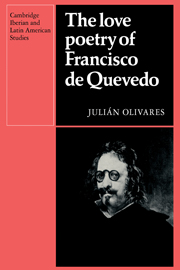Summary
Spain had declined as a world power by the seventeenth century. A political and economic decay accentuated a spiritual and moral turmoil, causing the country's optimism to yield to bitterness, cynicism and resignation. A mood of desengaño, disillusionment, now prevailed. Yet, if on the one hand this spirit of disillusion encouraged a confrontation with the realities of the Spanish situation, on the other there was still the illusion that the glory of the past would return. A parallel situation occurs in literature with regard to the role of courtly love as the thematic basis of nearly all love poetry. The idealistic social and literary phenomenon of courtly love, now pervaded by reality, was on the verge of dissolution, maintained only by its form and the determination of a few idealists.
A prime social reason for the duration of courtly love was, as Leonard Forster sustains, that it was a game which could be taken seriously or frivolously:
what for Petrarch himself was deadly serious became for his successors a game, which like all games can be serious or not as circumstances require … But though it was a game – perhaps because it was a game – it provided the framework within which genuine love-making and courtship leading to a marriage could be … conducted. On the other hand, it need be no more than a game – it could be serious or as frivolous as you wanted.[…]
- Type
- Chapter
- Information
- The Love Poetry of Francisco de Quevedo , pp. 1 - 17Publisher: Cambridge University PressPrint publication year: 1983
- 1
- Cited by

